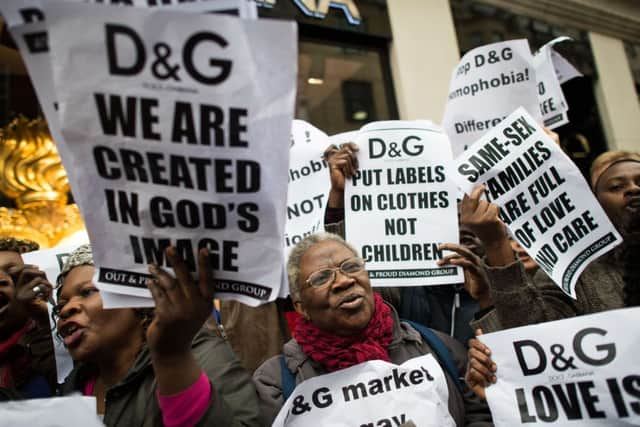Dani Garavelli: Synthetic debate over IVF


And while gay father-of-two and loyal D&G customer Elton John has every right to be offended, there was something contrived about celebrities such as Madonna, Victoria Beckham and Ricky Martin jostling for a spot on the moral high ground and promising to burn their clothes.
The world – and Italy in particular – is full of people who believe in the “traditional family”. They diss the child-free, they diss single mothers, they diss working mothers, all without provoking an A-list backlash. Personally, I find the Sicilian norm of 70 per cent of unmarried men under the age of 35 living with their mothers and D&G’s latest show – a sickly paean to “La Mamma” – much more questionable than same-sex parenthood, but that’s just an opinion; and I’m sure D&G won’t boycott my column because I’ve chosen to express it.
Advertisement
Hide AdAdvertisement
Hide AdNever mind “synthetic” children, the whole show-business-will-eat-itself stramash – from the much-hyped interview in Panorama magazine to Elton John’s angry riposte, to Gabbana calling John a “fascist”, to Dolce back-peddling – seemed simulated and insincere.
But if the original controversy was as superficial as David Cameron’s smile, then the wider discussion it has prompted on gay parenting was not. Since the fashion designer shared his opinions on IVF and surrogacy – “You are born from a father and a mother. Or at least that is how it should be. For this reason I am not convinced by what I call children of chemistry, or synthetic children. Uteruses for rent, sperm chosen from a catalogue” – there have been many thought-provoking contributions, and I’m not referring to Madonna’s “all babies contain a soul” speech.
Normally when gay families come under scrutiny, campaigners on both sides of the debate take up their default positions, but last week a number of people raised by same-sex parents gave first-hand accounts of their own experiences; and what they had to say was illuminating.
First, in an open letter published on a conservative US website, Heather Barwick, who was brought up by lesbians, said that although her mother’s partner treated her as her own, she “ached every day” for her absent father. “[My mother] left him when I was two or three because she wanted a chance to be happy with someone she really loved: a woman,” she wrote. “My dad wasn’t a great guy, and after she left him, he didn’t bother coming around any more.”
Then, in The Tablet, a Catholic weekly, Dawn Stefanowicz said she and five other people raised by gay parents had written to D&G to thank them for speaking out. “Children of gay parents are not just blank slates. We are a combination of both nature and nurture,” she said. “Gay parenting removes one of our biological parents, creating an unrecoverable, permanent loss for us.” Stefanowicz went on to talk about growing up with a father who had a succession of partners and no respect for women.
Finally Zach Wahls – who was conceived through IVF and raised by lesbians – explained how, as a child, he had written a Father’s Day card telling his sperm donor he’d like him to come and live with him, but added: “Whatever absence there may have been in my life was seamlessly filled by the love, camaraderie, and support of my friends and family.” Wahls has grown up to be an outspoken advocate of equal marriage.
These contrasting tales tell us something, but it’s not that straight parents are better than gay ones, or vice versa. Rather, what they demonstrate is that there’s good parenting and bad parenting, regardless of sexual orientation.
From their own accounts, Barwick’s unhappiness derived from her father’s abandonment and Stefanowicz’s from having a series of “uncles” and feeling undervalued. Many children raised in heterosexual households will have similar stories and an equally profound sense of loss.
Advertisement
Hide AdAdvertisement
Hide AdIndeed, most of us face some upheaval in our childhood: death, divorce, unemployment, depression, bullying; and it’s not unusual to long for some idealised version of a family which doesn’t exist.
Whether or not children become well-adjusted adults depends less on how they were conceived or on the make-up of their household, and more on how invested their parents are in their well-being.
Wahls’ anecdote about the Father’s Day card underlines the importance of acknowledging the particular challenges of gay parenting as opposed to pretending it comes without baggage. But then all parents need to identify and deal with the potential pitfalls inherent in their own circumstances.
If Dolce truly believes being gay means he shouldn’t become a father, then it’s no-one’s tragedy but his own. In the past few years, the stigma around gay parenting has been on the wane. IVF has given thousands of couples – gay and straight – the chance to raise children. That some of them will be better at it than others goes without saying. But the thread that links happy families isn’t wealth or status or sexuality: it’s love. And there’s nothing synthetic about that. «